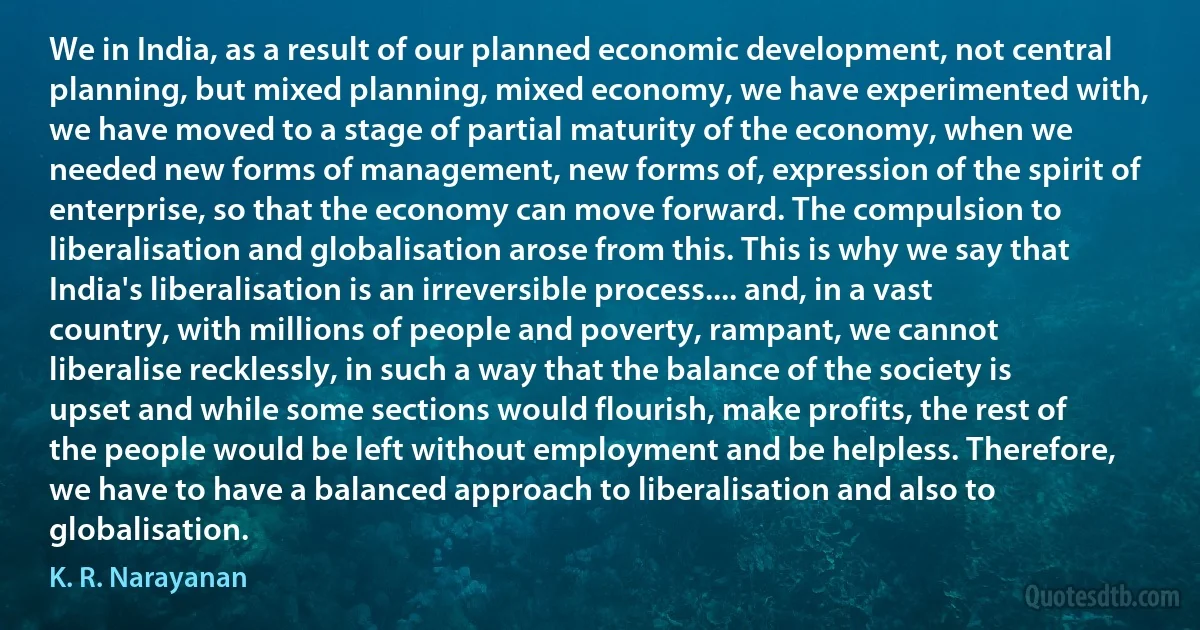
We in India, as a result of our planned economic development, not central planning, but mixed planning, mixed economy, we have experimented with, we have moved to a stage of partial maturity of the economy, when we needed new forms of management, new forms of, expression of the spirit of enterprise, so that the economy can move forward. The compulsion to liberalisation and globalisation arose from this. This is why we say that India's liberalisation is an irreversible process.... and, in a vast country, with millions of people and poverty, rampant, we cannot liberalise recklessly, in such a way that the balance of the society is upset and while some sections would flourish, make profits, the rest of the people would be left without employment and be helpless. Therefore, we have to have a balanced approach to liberalisation and also to globalisation.
K. R. NarayananRelated topics
approach central country development forward left move partial people plan planning poverty rest result say spirit vast way while profits liberalisation globalisationRelated quotes
Production, and production alone, can find us relief in our immediate situation. It is no part of the British character to resign ourselves to such difficulties or to fail to take the measures, however hard, to overcome them. It has been truly said that by our faith we can move mountains. It is by our faith in ourselves, in our country, in the free democratic traditions for which the people of this country have for centuries fought and battled, and for which they must fight again as willingly on the economic front as upon the oceans, on the land and in the air, it is by our faith in the deep spiritual values that we acknowledge in our Christian faith, that we shall be enabled and inspired to move the present mountains of our difficulties, and so emerge into that new and fertile plain of prosperity which we shall travel in happiness only as the result of our own efforts and our own vision.

Stafford Cripps
Development means a capacity for self-sustaining growth. It means that an economy must register advances which in turn will promote further progress. The loss of industry and skill in Africa was extremely small, if we measure it from the viewpoint of modern scientific achievements or even by standards of England in the late eighteenth century. However, it must be borne in mind that to be held back at one stage means that it is impossible to go on to a further stage. When a person was forced to leave school after only two years of primary school education, it is no reflection on him that he is academically and intellectually less developed than someone who had the opportunity to be schooled right through to university level. What Africa experienced in the early centuries of trade was precisely a loss of development opportunity, and this is of the greatest importance.

Walter Rodney
A final aspect of all open access orders is Schumpeter's notion of creative destruction, one of the most powerful descriptions of a competitive, open access economy. When Schumpeter wrote Capitalism, Socialism, and Democracy in the early 1940s, the economic theory of perfect competition among atomistic firms (i. e., firms too small to have market power) had come under sustained attack as unrealistic. Large and powerful economic organizations dominated the new economy, and their behavior did not match the textbooks. Despite this dominance, the economy produced historically unprecedented, sustained economic development. Schumpeter asked, How could large businesses that were supposed to choke off competition and growth nonetheless generate such spectacular productivity increases in a world that seemed ever more competitive?

Douglass North
But what you've also seen is a trend in the United States but also around the world in which even when the economy grows, it tends to benefit a lot of people at the very top, but the vast majority of people, they don't benefit as much. And you're starting to see bigger and bigger gaps in inequality and in wealth and in opportunity. And that's true not just in the United States, it's true in Europe; it's long been true in parts of Asia; it's been true in Latin America. And I believe that economies work best when growth and development is broad-based, when it's shared -- when ordinary people, if they work hard and they take responsibility, they can succeed. Not everybody is going to be rich, but everybody should be able to live a good life. Not everybody is going to be a billionaire, but everybody should be able to have a nice home and educate their children and feel some sense of security.

Barack Obama
The revolution of 1832 was, therefore, in its ultimate results, a democratic revolution, though its earlier form was transitional and incomplete. This form was productive of great advantages for the time: indeed, for some years it might be said, without exaggeration, that the accidental equilibrium of political forces which it had produced presented the highest ideal of internal government the world had hitherto seen. But it was not the less provisional on that account. The forces by which political organisms are destroyed were, for the time, balanced by influences which still lingered, and were, therefore, neutralised. But these were increasing, and the others were decaying, and the balance could not last for any length of time. It has now been finally upset, and we have now fully reached the phase of political transformation to which the revolution of 1832 logically led.

Robert Gascoyne-Cecil, 3rd Marquess of Salisbury
